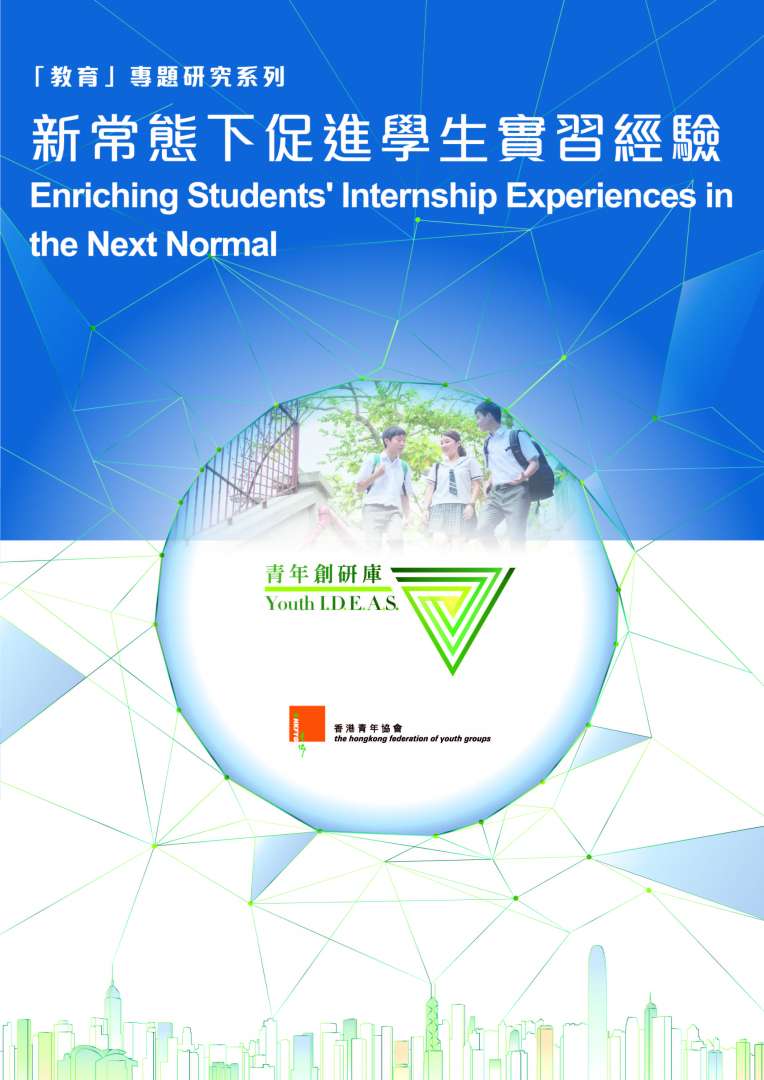Enriching Students’ Internship Experiences in the Next Normal
Youth I.D.E.A.S. 55
Education
Enriching Students’ Internship Experiences in the Next Normal
30 November, 2020

Internships are important for university students to gain work experience and develop their skills before transitioning from education to the workplace. During an internship, a student can learn workplace culture and gain insights about their future career planning. Universities also recognise the importance of internships; The Hong Kong Polytechnic University has made internships a compulsory graduation requirement since 2005/06[1].
However, COVID-19 has severely disrupted the internship planning of students. The number of Internship vacancies has dropped and have changed to become virtual. According to the Joint Institutions Job Information System (JIJIS) database, there were 5,777 internship vacancies for university students between Jan-Apr 2020, a decline of approximately 32% from 8,468 for the same period in 2019[2]. In response to the pandemic, the government has encouraged corporations to adopt a “Work From Home” strategy[3], leading the trend of virtual internships. As internship opportunities decrease and the work model has changed, this report explores ways of enriching students’ internship experiences in the next normal.
Given the restrictions on face-to-face internships, tertiary institutions have developed alternative options. Virtual internship (i.e. online internship) has become the main strategy and covers communication and management skills training: requiring interns to conduct research for enterprises[4]. In the business sector, both Hong Kong[5] and international corporations[6] have launched some innovative virtual internship programmes. As the current internship model has changed, so future internships will become more diversified in the next normal.
The continuing COVID-19 pandemic, changing skills-demand in the next normal and advancement in technology have all affected the development of student internships. This study aims to examine the impact of the changing internship model on students and the support they need. We will also explore ways to enrich both students’ internship and their learning experience with the aim of equipping students with the future skills required to align with social development trends and workplace demands.
The study collected information through four means: literature review, online questionnaire (with 877 university students who intended to join an internship this year), and interviews with 21 youth cases and 5 experts (who are familiar with student internship development), conducted during September and October.
Discussion
- Internship experience is important for students to help them begin the transition from education to the workplace. All parties should help students to explore possible options when fewer internship opportunities are available.
- COVID-19 has changed the internship model, leading to the development of virtual internships which has created more insights for future opportunities.
- While face-to-face internship has its own importance, virtual internship also has its advantages. A future hybrid model can provide a more meaningful learning experience for students that is in line with social development trends.
- Difficulties that students encountered during virtual internships included fewer opportunities to experience work culture, low communication effectiveness, fewer learning opportunities and the lack of a sense of reality. Virtual internship is also limited by industry and job nature. It is worth exploring how to improve the virtual internship model to enhance students’ needs.
- Other than virtual internship, there is a need to explore other learning opportunities for students who lack internship experience. These can include providing platforms and opportunities for students to apply their knowledge at community level.
- In the next normal, employers will require students to have multiple and updateable skills in an ever-changing environment. Students should be more pro-active to equip themselves with the essential skills to handle future job-market challenges.
Recommendations
- Set up a virtual internship protocol and information kit.1.1 Virtual internship protocol with pre-internship materials.
1.2 Launch a virtual buddy scheme and increase two-way communication.
- Schools and NGOs can provide other learning opportunities for students and develop a virtual internship platform2.1 Social Community Schemes.
2.2 Job experience sharing and skills training.
2.3 NGOs can develop a one-stop online virtual internship platform.
- The Government could expand the overseas internship subsidy scheme to cover overseas virtual internship schemes.
- Students should take the initiative to acquire diverse skills to cope with the next normal
[1] The Hong Kong Polytechnic University.(2020). About WIE. Retrieved from https://www.polyu.edu.hk/sao/cps/career-services/internship-programmes/about-wie/
[2] Sky Post (May 7, 2020). The number of tertiary internships has dramatically decreased by 30%.
[3] News.gov.hk (July 23, 2020). Govt work arrangement extended. Retrieved from
www.news.gov.hk/eng/2020/07/20200723/20200723_150304_822.html
[4] Same as 2.
[5] Hong Kong Economic Daily. (May 14, 2020). New World promotes virtual internships to recruit 100 university interns.
[6] TOPick, Hong Kong Economic Daily. (July 16, 2020). Citibank’s changed its internship into virtual model. Retrieved from https://topick.hket.com/article/2697543/




